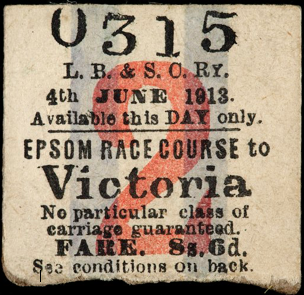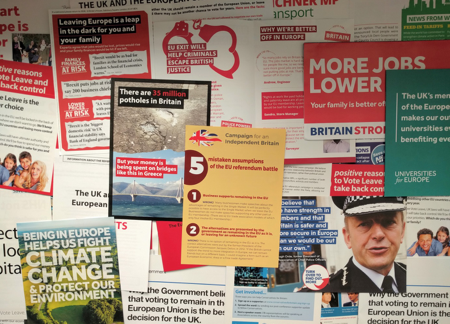![]() Now that so much campaign literature and political debate is produced and takes place online, libraries face different challenges in capturing and archiving it. Daniel Payne explains how the LSE Library is collecting ephemera relating to the June 23 referendum.
Now that so much campaign literature and political debate is produced and takes place online, libraries face different challenges in capturing and archiving it. Daniel Payne explains how the LSE Library is collecting ephemera relating to the June 23 referendum.
The key political moments of the past generated a huge body of ephemera. Meaning “lasting only a day”, this format of information typically refers to material which is produced for a particular purpose, perhaps for a specific event, but not intended to last beyond that.
An example would be a return train ticket from Epsom to London Victoria found in the purse of suffragette Emily Wilding Davison shortly after her death (see item 12 of LSE Library’s online exhibition for the full story).

Another example would be a collection of political and tariff reform posters produced around the late 20th century, where, if you have forgotten how to cringe, you can practise it twice with “The Wife’s Appeal” poster (below) – digitised and made available online.
Collections of ephemera are important because they offer a different perspective on historical events than the body of information that is ‘officially’ produced (e.g. books by publishing houses).
Traditionally, libraries and archives have recognised the importance of this material and have collected it so that it can be made available for research. The nature of ephemera means this happens via a sort of managed happenstance, where ephemera is gathered by individuals and organisations and then donated to libraries. Libraries will also actively solicit this material, but these collections can only ever be snapshots. Whereas publishers must by law deposit a new book with a legal deposit library, there is (thankfully) no requirement for any of us to deposit our train tickets.
What does this mean for the UK’s EU referendum in 2016?
If printed ephemera were not hard enough to collect, preserve and make available in perpetuity, along came the internet. Unlike the 1975 referendum on the common market, a great deal of information being produced for the 2016 referendum is produced online. Nearly everything surrounding political events is now more ephemeral. This is problematic for two reasons.

Firstly, it ramps up the vulnerability of this information. A webpage can disappear or change in less than a second. The British Library’s web archive, which has been archiving websites since 2004, demonstrates this vulnerability over time.
Secondly, the potential range of formats are both more numerous and more complicated to capture. Now we don’t just have posters and return train tickets to preserve in a box, we have YouTube videos, blogposts, Facebook, Twitter, PDFs, JPEGs, HTML statements from trade unions and businesses, emails, password-protected digital material – the list is endless.
How is online referendum ephemera being preserved?
The legislation which requires a copy of every UK print publication to be given to the UK legal deposit libraries was extended in 2013 to include material published electronically (e.g. websites). Therefore a great deal of UK-based political ephemera is being archived by the British Library and other legal deposit libraries. However, due to that legislation, these archived websites can only be viewed on a single computer in the library premises of one of the legal deposit libraries.
In addition, the British Library also provides an open access UK Web Archive. This contains a much smaller set of archived websites, since these are only made available online after permission from the webpage owners has been sought. Here for example, is the open access web archive of pages from the European Parliament Elections 2009. These collections of archived websites are essential records of our cultural past. The Internet Archive, a US based Internet Library, also crawls and archives the web, converting information on the Internet “from ephemera to artifact”.
What is LSE Library doing?
- We are collecting any printed ephemera or objects related to the UK’s EU referendum. Please get in touch with the curator for politics if you have something to contribute.
- Research produced by LSE academics is made open access wherever possible on LSE’s institutional repository, which aims to preserve and make available the School’s intellectual output for prosperity (eg the report “Would Brexit matter?”)
- We are conducting a pilot project to manually search the web for any document that contributes to the debate surrounding the referendum. Attaching metadata that would make this collection useful to the researcher, we then hope to make this available open access on LSE’s Digital Library.
For further information on accessing and using the LSE’s unique collection of material surrounding Britain and its relationship to the EU, get in touch with Daniel: d.payne1@lse.ac.uk.
This post represents the views of the author and not those of BrexitVote, nor the LSE.
Daniel Payne is curator for the politics and international relations collections at the LSE Library.








1 Comments